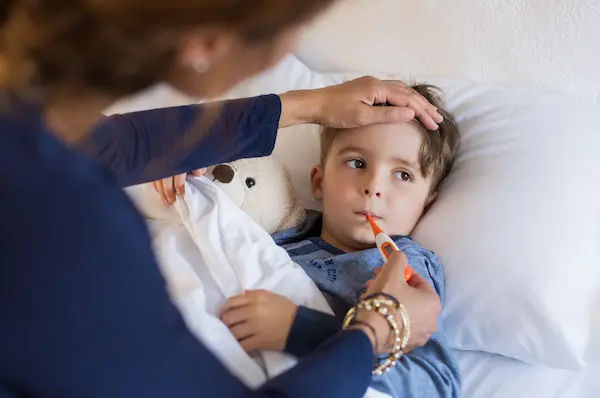What Leads To Fever In Kids and What are the Symptoms
Learn about the causes of fever in kids, its common symptoms, and when to seek medical attention. Understand how to manage fever effectively at home.

Written by Dr. Shaik Abdul Kalam
Reviewed by Dr. Rohinipriyanka Pondugula MBBS
Last updated on 13th Jan, 2026

Introduction
Discovering your child is warm to the touch is a moment that sends a jolt of worry through any parent. Fever in kids is one of the most common reasons for pediatrician visits and late-night anxiety. But what if we told you that a fever is not the enemy? It is actually a critical sign that your child's immune system is working exactly as it should, mounting a powerful defense against invading germs. This comprehensive guide will demystify what causes a fever in kids, decode the symptoms that accompany it, and provide clear, actionable advice on how to provide comfort and know precisely when to seek professional medical help. We’ll move beyond the fear and equip you with the knowledge to care for your sick child with confidence.
What is a Fever? The Body's Defense Mechanism
A fever is defined as a temporary increase in body temperature, often due to an illness. It's a biological response, not an illness itself. The American Academy of Pediatrics defines a fever as a rectal temperature of 100.4°F (38°C) or higher.
How the Body's Thermostat Works
Think of the hypothalamus in your brain as the body's thermostat. Normally, it sets your temperature around 98.6°F (37°C). When white blood cells detect an invader like a virus or bacteria, they release chemicals called pyrogens. These pyrogens travel to the hypothalamus and effectively tell it to turn up the heat. This higher temperature creates a less hospitable environment for germs and helps the immune system work more efficiently to fight off the infection.
Why a Fever Can Actually Be a Good Sign
While uncomfortable, a fever is a positive indicator of a robust immune system. It’s the body's natural defense mechanism in action. The goal of treatment should rarely be to eliminate the fever entirely, but rather to manage it to keep your child comfortable and hydrated while their body does its important work.
Consult Top Specialists for Personalised Tips
Common Causes of Fever in Children
Understanding the root cause is key to managing your child's illness. The vast majority of fevers are caused by common, self-limiting infections.
Viral Infections: The Most Frequent Culprits
Viruses are responsible for most childhood fevers. They run their course and are not treatable with antibiotics.
Common Cold and Influenza (Flu): These often present with fever, cough, runny nose, and body aches. The flu typically causes a higher, more sudden fever in a child and more severe fatigue.
Roseola and Other Childhood Viruses: Roseola is classic for causing a very high fever (often over 103°F) for 3-5 days in a baby or toddler. When the fever breaks, a distinctive rash appears on the trunk.
Bacterial Infections: When to Be More Concerned
Bacterial infections are less common but can be more serious and often require antibiotic treatment.
Ear Infections (Otitis Media): A common complication of colds, causing ear pain and fever.
Strep Throat: Caused by Streptococcus bacteria, it often presents with a sudden sore throat, fever, and headache, but usually without a cough.
Pneumonia: A lung infection that can cause high fever, cough, and difficulty breathing.
Urinary Tract Infections (UTIs): Can cause a fever with no other obvious symptoms, especially in young children.
Other Potential Causes
These include immunizations (a mild, low-grade fever is a normal immune response), overheating (from overdressing or a hot environment), or less commonly, inflammatory conditions.
Decoding Fever Symptoms: What Your Child's Body is Telling You
The fever itself is just one part of the picture. The accompanying symptoms provide crucial clues about the underlying illness.
Common Symptoms: Chills, Sweating, and Lethargy
As the body's thermostat resets to a higher temperature, your child may feel cold and shiver (chills) to generate heat. Once the fever stabilizes, they may feel warm and flushed. When the body begins to fight off the infection and the thermostat resets to normal, the body sweats to cool down. It's also perfectly normal for a child with a fever to be tired, sleepy, and less interested in playing; energy is being diverted to the immune system.
Understanding Febrile Seizures
One of the most frightening symptoms for parents is a febrile seizure—a convulsion triggered by a rapid spike in temperature. They occur in 2-5% of children between 6 months and 5 years. While terrifying to witness, most are brief (less than 2 minutes), harmless, and do not indicate long-term neurological problems. However, any seizure requires immediate medical evaluation to rule out serious causes like meningitis.
How to Accurately Take Your Child's Temperature
Accuracy is key to proper management. The best method depends on your child's age.
Under 3 months: Rectal thermometer (most accurate).
3 months to 4 years: Rectal, temporal artery, or tympanic (ear) thermometers. Axillary (underarm) is acceptable for screening but less accurate.
4 years and older: Oral, temporal artery, or tympanic.
Best Types of Thermometers for Kids
Digital multi-use thermometers are the standard. Temporal artery thermometers (forehead scanners) are quick and non-invasive, making them excellent for restless children. Avoid old glass mercury thermometers.
Effective Home Care and Management
The primary goal is comfort, not achieving a specific number on the thermometer.
Keeping Your Child Comfortable
Dress them in lightweight clothing and use a light blanket if they have chills. A lukewarm sponge bath can provide comfort if the fever is very high and the child finds it soothing (never use cold water or ice).
The Role of Fluids and Nutrition
Hydration is the single most important part of home care. Fever increases fluid loss. Offer small, frequent sips of water, clear broth, oral rehydration solutions, or popsicles. Don't worry if their appetite is low; focus on fluids first.
Using Fever-Reducing Medication Safely
Acetaminophen (e.g., Tylenol) and ibuprofen (e.g., Advil, Motrin - for children over 6 months) are effective. Crucially, always dose based on your child's weight, not their age. Never give aspirin to a child due to the risk of Reye's syndrome. Medication is not always necessary if the child is comfortable and drinking well.
When to Call a Doctor Immediately
This is the most critical information for parents. Trust your instincts—you know your child best.
Age-Specific Warning Signs
Under 3 months: Any rectal temperature of 100.4°F (38°C) or higher requires immediate medical attention.
3-6 months: A temperature over 102°F (38.9°C) or signs of irritability or lethargy.
Any age: A fever that lasts more than 3 days.
Symptoms That Require Urgent Medical Attention
Severe lethargy or difficulty waking.
Signs of dehydration (no tears when crying, sunken eyes, no wet diapers/urination for 8+ hours).
Difficulty breathing or rapid breathing.
Severe headache, stiff neck, or a purplish rash.
A seizure (febrile or otherwise).
Persistent vomiting.
Inconsolable crying or signs of severe pain.
If your child exhibits any of these red flags, consult a doctor online with Apollo24|7 for immediate guidance or seek emergency care.
Diagnosing the Cause: What a Doctor Might Do
If you seek medical care, the doctor will conduct a thorough examination to find the source of the fever. This includes checking the ears, throat, and lungs, feeling the abdomen, and assessing the skin for a rash. They will ask about other symptoms. Based on their findings, they may order tests. For instance, if strep throat is suspected, a rapid strep test may be performed. For a suspected UTI with no clear source of fever in kids, Apollo24|7 offers a convenient home collection for urine tests to get a quick and accurate diagnosis without a stressful lab visit.
Conclusion
Navigating your child's fever can feel overwhelming, but understanding why behind it empowers you to respond with care and clarity. Remember, a fever is the body's intelligent, built-in defense mechanism at work. Your role is to be a calm and comforting presence, ensuring your child stays hydrated and restful while monitoring for those crucial warning signs. By focusing on their overall well-being rather than fixating on the temperature reading, you can provide the best support. Keep this guide handy, and never hesitate to seek professional medical advice when your intuition tells you it's needed. Your vigilance and love are the most powerful medicines of all.
Consult Top Specialists
Consult Top Specialists for Personalised Tips

Dr. Rajib Ghose
General Physician/ Internal Medicine Specialist
25 Years • MBBS
East Midnapore
VIVEKANANDA SEBA SADAN, East Midnapore

Dr. Swagato Podder
General Practitioner
5 Years • MBBS
Kolkata
GRD POLYCLINIC, Kolkata

Dr. Dayanashre N
General Physician
3 Years • MBBS
Bengaluru
PRESTIGE SHANTHINIKETAN - SOCIETY CLINIC, Bengaluru

Dr. Moumita Roy
General Physician/ Internal Medicine Specialist
8 Years • MBBS , MD (Anesthesiology)
Kolkata
VDC Clinic, Kolkata

Dr. Arif Ahmed
General Physician/ Internal Medicine Specialist
9 Years • MBBS, MD (Genl. Med.)
Kolkata
MCR SUPER SPECIALITY POLY CLINIC & PATHOLOGY, Kolkata
Consult Top Specialists

Dr. Rajib Ghose
General Physician/ Internal Medicine Specialist
25 Years • MBBS
East Midnapore
VIVEKANANDA SEBA SADAN, East Midnapore

Dr. Swagato Podder
General Practitioner
5 Years • MBBS
Kolkata
GRD POLYCLINIC, Kolkata

Dr. Dayanashre N
General Physician
3 Years • MBBS
Bengaluru
PRESTIGE SHANTHINIKETAN - SOCIETY CLINIC, Bengaluru

Dr. Moumita Roy
General Physician/ Internal Medicine Specialist
8 Years • MBBS , MD (Anesthesiology)
Kolkata
VDC Clinic, Kolkata

Dr. Arif Ahmed
General Physician/ Internal Medicine Specialist
9 Years • MBBS, MD (Genl. Med.)
Kolkata
MCR SUPER SPECIALITY POLY CLINIC & PATHOLOGY, Kolkata
More articles from Fever
Frequently Asked Questions
What is considered a high fever for a child?
A high fever is generally considered to be 102°F (38.9°C) or higher. However, the height of the fever is less important than how your child is acting. A child with a 103°F fever who is drinking and interactive is often less concerned than a child with a 101°F fever who is extremely lethargic and irritable.
My child has a fever but no other symptoms. What could it be?
A fever with no other symptoms is common, especially in the early stages of a viral illness. Other symptoms like a cough or runny nose may appear within 24 hours. It can also indicate a urinary tract infection (UTI), which can be hard to detect in very young children who can't verbalize pain.
How can I tell if it's a viral or bacterial fever?
There's no surefire way for parents to tell, but general patterns exist. Viral fevers are more common and often accompanied by generalized symptoms like a runny nose, cough, and body aches. Bacterial infections often cause more localized symptoms (e.g., ear pain, painful urination, a single sore throat) and may cause a child to appear sicker. Only a doctor can make a definitive diagnosis.
Is it normal for a fever to spike at night?
Yes, it's very common for a child's fever to be higher at night. The body's circadian rhythm causes a natural dip in cortisol (an anti-inflammatory hormone) at night, which can allow fevers to rise more easily. This is why many parents first notice a significant fever in the evening.
Should I wake my sleeping child to give them fever medicine?
No. Sleep is restorative and more valuable than a slightly elevated temperature. If your child is sleeping comfortably, let them rest. The goal of medicine is comfort, and if they are comfortable enough to sleep, they don't need it. Only administer medicine if they are awake, uncomfortable, and in pain.

.webp)


.webp)